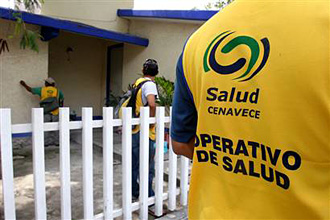Mexico, Venezuela Implement Counter-Dengue Measures
 An Lu - Xinhua An Lu - Xinhua
go to original


| | A anti-dengue brigade, belonging to the municipal health department mark a home after checking for standing water or other areas where mosquitoes breed in the resort city of Cancun, Mexico. |
Mexico City - Mexico and Venezuela have begun to carry out measures against Aedis Aegyptii mosquito that spreads dengue fever, Mexico media reported this week.

According to a statement released by Mexican health authorities, they have dispatched health workers to regions hit by Hurricane Dean to help fight the dengue fever. A warning has been issued for the states of Yucatan, Quintana Roo, Campeche, Tabasco, Veracruz, Hidalgo, Puebla and Mexico.

The workers would teach local residents how to prevent the forming of water deposits, where mosquito breeds. The mosquito spreads dengue with its bites.

According to the Mexican government, a total of 12,329 cases of dengue have been reported in the nation, including 10,136 of classic dengue and 2,193 hemorrhagic dengue.

Venezuela's Health Minister Jesus Montilla Tuesday delivered 128 vehicles, 550 fumigators and 24,000 gallons of insecticide as part of the ministry's Dengue and Malaria Prevention plan.

Municipal authorities and communities will implement the plan via health committees, which will educate people to fight mosquito that spreads the disease.

Meanwhile, Venezuela also plans to spend 28 billion bolivars (13 million U.S. dollars) in fighting the disease. The health ministry will dispatch amphibious vehicles to communities' worst hit by dengue and malaria.

"We will do all within our reach to halt these endemic diseases, whose potential occurrence has increased a great deal this year, with the start of the rainy season," the minister said.

Dengue is caused by four closely related viruses and is spread by the Aedes Aegypti mosquito, which breeds in still water. Its symptoms include high fever, nausea, rashes, backache and headaches. Most mainstream dengue cases are not fatal, but the hemorrhagic variant, which causes severe internal bleeding as blood vessels collapse, can kill up to 20 percent of its patients. |



